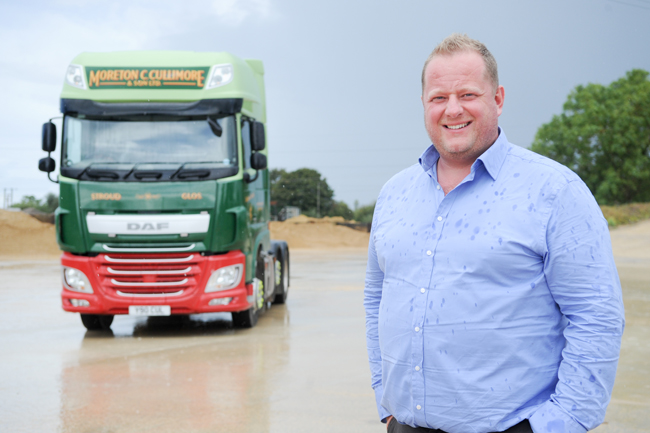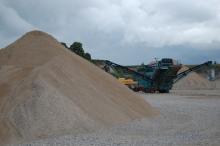
%$Linker:
Consistent investment in premium quarrying equipment is helping The Cullimore Group maintain its proud tradition of high-quality aggregates supply. Guy Woodford visited the group’s Gloucestershire, western England HQ to gain a first-hand take on its successful business strategy.
Investing only in premium aggregates processing equipment has been a key priority within The
Three generations have steered the aggregates and haulage group’s reins, a group achieving sales of around £15 million (€17.09mn)/year (£4-5mn of gravel, £4-5mn of concrete, £3mn of transport haulage-related business, and £2-4mn from farming). The bulk of The Cullimore Group’s customers are based in the west of England (Gloucestershire, Wiltshire, Oxfordshire and Avon & Somerset), with its greatly prized gravel and sharp sand products currently being drawn from three quarries – Wetstone Bridge, Shorncote and Dairy Farm - all in the Cotswold Water Park zone. A further two group quarries are currently being restored to nature.
Speaking to Aggregates Business during my visit to the group’s Netherhills HQ site, between the villages of Frampton on Severn and Whitminster, nine miles south-west of Gloucester, The Cullimore Group’s managing director, Moreton Cullimore, spoke of the importance of relationships in the aggregates and haulage supply business, between group employees and customers and between the group and its equipment suppliers.
“Identity is part of the furniture of Gloucestershire. For both my grandfather and father, reputation was everything. The way we go about business is that our customers are names and faces, not bar codes and serial numbers. We are upfront and honest. If we say we are going to do something, we do it. What we hear from customers in their dealings with multi-nationals is that they initially went with them because they were, for example, £2 cheaper a metre on concrete. But many found it was a case of, ‘I’m here at 4pm waiting for my delivery and being told my supplier has got bigger fish to fry.’ We will still be there with customers at 6pm or 7pm making sure that a job is complete and to their satisfaction. It’s a bit about old school honour and respect.”
Cullimore says the way The Cullimore Group buys things is a “little old-fashioned, but it’s always worked”. He explains: “We don’t lease things for two to three years. We buy premium equipment and keep it for its life. We buy from people like
Cullimore says The Cullimore Group has had a long-time relationship with
The Cullimore Group currently uses a Terex Finlay TC15 SANDMASTER wash plant in its sharp sand and Cotswold shingle production. The group also uses a Terex Finlay 883 screener for producing recycled aggregates out of inert waste. This material supports the quarry restoration side of The Cullimore Group, a side which also benefits from deploying Cat D6T wide-track crawler dozers.
Turning his attention to the group’s loading and hauling models, Cullimore says: “We have a diverse range as some of our sites are bigger than others. Sometimes you need more breakout force as there may be rock underneath the clay. Generally, we use medium-large range rather than super-large range machines. We run 40-tonne Volvo EC380s and Cat 325s, 328s and 330s, ranging from 25 to 40 tonnes. All the Caterpillar excavators use Cat breakers. We also use a Cat 962 wheeled loader, Cat 740 articulated dump trucks and Bell 35D ADTs. There are a few smaller excavators that we use, like a Cat 103.8, which is a 3.5-tonner, and a JCB 8-tonner.”
Cullimore says the Volvo EC380s The Cullimore Group have purchased in the last two years have proven “very quiet” machines during working hours. This is helping the group retain positive relationships with people living near to its quarry sites. “The technology is also up there, and Volvo came to the table on price,” he adds.
The Cullimore Group is currently producing around 400,000tonnes/year of Cotswold shingle and sharp sand across its three active quarry sites. This figure, Cullimore stresses, can be variable and is under production capacity, due to the need to comply with local authority planning restrictions.
“We’ve been working Wetstone Bridge for two years and it is our primary quarry. It’s open five and a half days a week. Our sharp sand has a golden colour and is decorative in nature. It makes it popular with the wannabe Alan Titchmarshes looking for something nice to decorate their gardens. Sharp sand also goes into making roof tiles and, along with our 20mm shingle, can go into our ready-mixed concrete plants. We have a diverse customer base, from delivering directly to the sub-contractors for the big housing developers, to tile manufacturers and the retail sector, where you have one-man bands looking for materials to incorporate into their property extensions.”
On a daily basis The Cullimore Group produces four Cotswold shingle and sharp sand products: -6mm sharp sand, 10mm shingle, or pea grit, as its known, a 10-20mm shingle, and a 20mm-plus, generally around 40mm, shingle. “We can make up to four different sized sharp sand products, depending on customer request,” explains Cullimore. “Sharp sand is coarse, and you wouldn’t use it in something like a plastering application.”
Speaking about the group’s Cotswold shingle and sharp sand production process, Cullimore says: “Sand and gravel processing is back to your old GCSE Geography stuff. You’re near a river so there’s a high water table. You can hit the water table with a hand shovel and strip the top soil off with an excavator and you are literally just digging out. The materials get loaded onto our 35-40-tonne ADTs [articulated dump trucks]. The ADTs then take the material to our quarry stockpile sites from where it’s loaded with our Cat 962 loading shovels into our Terex Finlay wash plant. After washing and further stockpiling, the material is loaded onto customer trucks and taken away. We produce around 150-160 tonnes an hour. We can produce more quickly but we are always looking at the quality of the product – aiming for a nice, clean material. We ourselves are one of our biggest customers in terms of supplying material to service the ready-mixed concrete side of our business. We are BSI-kitemarked, so we must scientifically prove what our products material make-up is.”
An HM Treasury-led review of the controversial UK Aggregates Levy is due to report back by the end of the year. First introduced as part of the Finance Act 2001, the levy came into force in April 2002 as a tax imposed upon the commercial exploitation of rock, sand and gravel in the UK. It has been largely unchanged since its introduction and has been frozen at a flat rate of £2 per tonne since 2009.
I ask Cullimore his thoughts on the levy. “Part of the UK Aggregates Levy motivation was that digging a finite resource that will run out one day creates emissions and means that you are not relying on recycling things. But the levy was supposed to create a pot of money that goes back into local communities to improve things, like reducing potholes in roads. I don’t see that happening. What I do see is how much material is going out the door and the £2 a tonne levies that must be being raised from it.
“I think that it’s also made, at times, some of the materials more difficult to sell. That creates something of a reverse logic effect. For example, one of the traditional markets for 10mm Cotswold shingle is for road drainage installations. But on raw materials there is a £2 a tonne levy which isn’t there on a recycled product. It automatically makes the recycled product cheaper and encourages greater use of recycled product, which is a good thing. But it also means that to get the sharp sand for building tiles, and the 20mm shingle to create ready-mixed concrete and other things, you can’t just choose to only dig for sharp sand or 20mm shingle, so you are getting more and more 10mm material anyway, as you need to dig through the raw material to get to the more desired products. It means you are creating bigger stockpiles of unwanted material that sit there for longer, creating the potential for more wastage.”
Cullimore believes that while aggregates demand is still there, the market is “volatile, very price-driven and inconsistent”. Offering an example of this, he says: “We’ll win a job and have it in the book saying that ‘X job is starting on May 18th’. You get your 20 delivery trucks and other equipment in place, but then you’ll get a call on May 17th saying that ‘We’ve only sold 50% of the houses on phase one of the development, so we’re not starting phase two tomorrow.’
“Because of Brexit [Britain’s still unresolved exit from the European Union], people are still building and buying homes, but they are not doing it with the same regularity of two or three years ago. If I’m a first-time buyer, do I risk getting a mortgage now, or two days after Brexit? What would you do? Whereas before developers were completing 50% sales of phase one of a housing development and then starting on phase two, they are now waiting to secure sales on 70%-80% of phase one homes before starting phase two. Whatever we do on Brexit we need to get on with it, as it’s holding markets back.”
Looking to the future of its aggregates products business, The Cullimore Group has a cross-county border application in with Wiltshire Council to extract from a field adjacent to its current Wetstone Bridge Quarry extraction site located in Gloucestershire. This would allow for another three-five years of potential mineral extraction. Cullimore says there are another 12 months’ mineral extraction possible at Shorncote Quarry, with Dairy Farm Quarry being used as a “bad weather back-up” extraction site.
“We also have a planning application in to extract from a two million tonne gravel reserves quarry on Bow Farm near Ripple in Worcestershire, near the Gloucestershire border. It’s probably another two years or so before we get a decision on that,” explains Cullimore. “It will give us six to eight years of further extraction, but it would be of a different mineral, a hard-wearing quartzite.”
%$Linker:







